.cnn_html_media_utility::before{color:red;content:'>>';font-size:9px;line-height:12px;padding-right:1px}.cnnstrylccimg640{margin:0 27px 14px 0}.captionText{filter:alpha(opacity=100);opacity:1}.cnn_html_slideshow_media_caption a,.cnn_html_slideshow_media_caption a:visited,.cnn_html_slideshow_media_caption a:link,.captionText a,.captionText a:visited,.captiontext a:link{color:#004276;outline:medium none}.cnnVerticalGalleryPhoto{margin:0 auto;padding-right:68px;width:270px}]]> There appears to be a shift in the United States in favor of relaxing marijuana laws, a topic that has dipped in and out of the national conversation for decades. Public perceptions about pot have come a long way, from the dire warnings of "Reefer Madness" to growing acceptance of medical marijuana.
There appears to be a shift in the United States in favor of relaxing marijuana laws, a topic that has dipped in and out of the national conversation for decades. Public perceptions about pot have come a long way, from the dire warnings of "Reefer Madness" to growing acceptance of medical marijuana.
 Sean Azzariti, an Iraq war veteran and marijuana activist, speaks to the media Wednesday, January 1, after becoming the first person to legally purchase recreational marijuana in Colorado. Colorado is the first state in the nation to allow retail pot shops. "It's huge," Azzariti said. "It hasn't even sunk in how big this is yet."
Sean Azzariti, an Iraq war veteran and marijuana activist, speaks to the media Wednesday, January 1, after becoming the first person to legally purchase recreational marijuana in Colorado. Colorado is the first state in the nation to allow retail pot shops. "It's huge," Azzariti said. "It hasn't even sunk in how big this is yet."
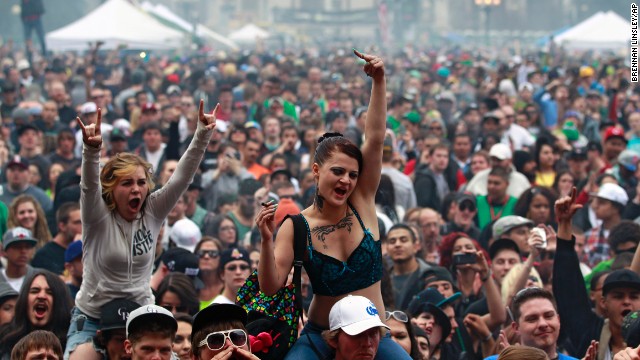 Members of a crowd numbering tens of thousands smoke and listen to live music at the Denver 420 Rally on April 20. Annual festivals celebrating marijuana are held around the world on April 20, a counterculture holiday.
Members of a crowd numbering tens of thousands smoke and listen to live music at the Denver 420 Rally on April 20. Annual festivals celebrating marijuana are held around the world on April 20, a counterculture holiday.
 A man smokes a joint during the official opening night of Club 64, a marijuana social club in Denver, on New Year's Eve 2012. Voters in Colorado and Washington state passed referendums to legalize recreational marijuana on November 6, 2012.
A man smokes a joint during the official opening night of Club 64, a marijuana social club in Denver, on New Year's Eve 2012. Voters in Colorado and Washington state passed referendums to legalize recreational marijuana on November 6, 2012.
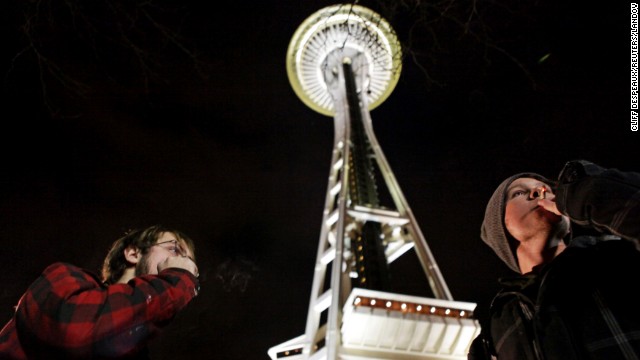 People light up near the Space Needle in Seattle after the law legalizing the recreational use of marijuana went into effect in Washington on December 6, 2012.
People light up near the Space Needle in Seattle after the law legalizing the recreational use of marijuana went into effect in Washington on December 6, 2012.
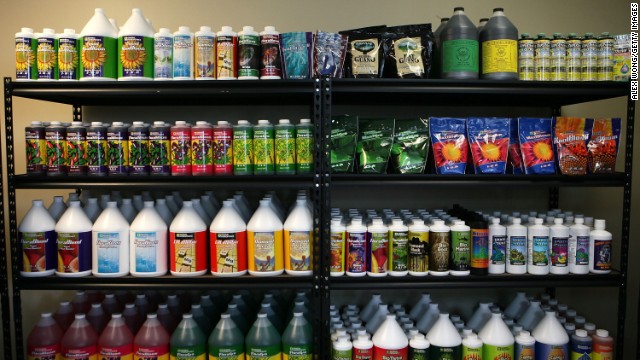 Nutrient products are placed on shelves in the weGrow marijuana cultivation supply store during its grand opening on March 30, 2012, in Washington, D.C. The store is a one-stop-shop for supplies and training to grow plants indoors, except for the actual marijuana plants or seeds. Legislation was enacted in 2010 authorizing the establishment of regulated medical marijuana dispensaries in the nation's capital.
Nutrient products are placed on shelves in the weGrow marijuana cultivation supply store during its grand opening on March 30, 2012, in Washington, D.C. The store is a one-stop-shop for supplies and training to grow plants indoors, except for the actual marijuana plants or seeds. Legislation was enacted in 2010 authorizing the establishment of regulated medical marijuana dispensaries in the nation's capital.
 Marijuana activist Steve DeAngelo wears a "Yes on Prop 19" button as he speaks during a news conference in Oakland, California, on October 12, 2010, to bring attention to the state measure to legalize marijuana for recreational purposes in California. Voters rejected the proposal.
Marijuana activist Steve DeAngelo wears a "Yes on Prop 19" button as he speaks during a news conference in Oakland, California, on October 12, 2010, to bring attention to the state measure to legalize marijuana for recreational purposes in California. Voters rejected the proposal.
 Sonja Gibbins walks through her growing warehouse in Fort Collins, Colorado, on April 19, 2010. Since the state approved medical marijuana in 2000, Colorado has seen a boom in marijuana dispensaries, trade shows and related businesses. So far 20 states and the District of Columbia have made smoking marijuana for medical purposes legal.
Sonja Gibbins walks through her growing warehouse in Fort Collins, Colorado, on April 19, 2010. Since the state approved medical marijuana in 2000, Colorado has seen a boom in marijuana dispensaries, trade shows and related businesses. So far 20 states and the District of Columbia have made smoking marijuana for medical purposes legal.
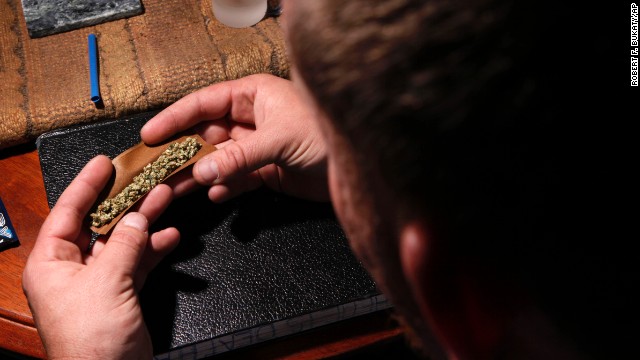 A patient prepares to smoke at home in Portland, Maine, on October 22, 2009, a decade after the state approved a medical marijuana referendum.
A patient prepares to smoke at home in Portland, Maine, on October 22, 2009, a decade after the state approved a medical marijuana referendum.
 Coffeeshop Blue Sky worker Jon Sarro, left, shows a customer different strains of medical marijuana on July 22, 2009, in Oakland, California. Voters in the city approved a measure during a vote-by-mail special election for a new tax on sales of medicinal marijuana at cannabis dispensaries.
Coffeeshop Blue Sky worker Jon Sarro, left, shows a customer different strains of medical marijuana on July 22, 2009, in Oakland, California. Voters in the city approved a measure during a vote-by-mail special election for a new tax on sales of medicinal marijuana at cannabis dispensaries.
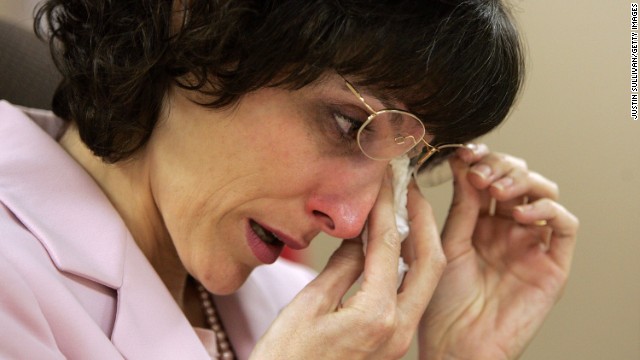 Medicinal marijuana patient Angel Raich wipes her eyes during a press conference on March 14, 2007, in Oakland, California. The 9th circuit U.S. Court of Appeals in San Francisco ruled that 41-year-old Raich, who used medicinal marijuana to curb pain from a brain tumor as well as other ailments, did not have the legal right to claim medical necessity to avoid the possibility of prosecution under federal drug laws.
Medicinal marijuana patient Angel Raich wipes her eyes during a press conference on March 14, 2007, in Oakland, California. The 9th circuit U.S. Court of Appeals in San Francisco ruled that 41-year-old Raich, who used medicinal marijuana to curb pain from a brain tumor as well as other ailments, did not have the legal right to claim medical necessity to avoid the possibility of prosecution under federal drug laws.
 Different varieties of medical marijuana are seen at the Alternative Herbal Health Services cannabis dispensary in San Francisco on April 24, 2006. The Food and Drug Administration issued a controversial statement a week earlier rejecting the use of medical marijuana, declaring that there is no scientific evidence supporting use of the drug for medical treatment.
Different varieties of medical marijuana are seen at the Alternative Herbal Health Services cannabis dispensary in San Francisco on April 24, 2006. The Food and Drug Administration issued a controversial statement a week earlier rejecting the use of medical marijuana, declaring that there is no scientific evidence supporting use of the drug for medical treatment.
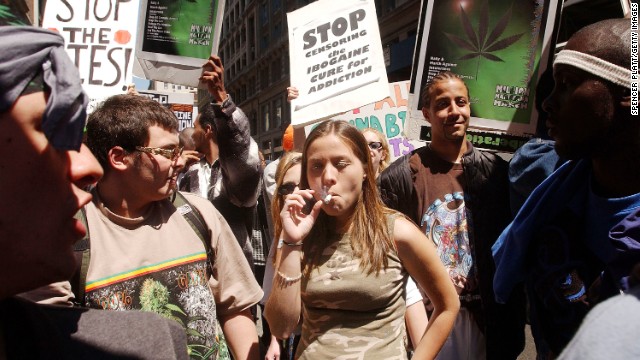 People in New York gather for a pro-cannabis rally on May 4, 2002. That same day, almost 200 similar events took place around the world to advocate for marijuana legalization. It was dubbed the "Million Marijuana March."
People in New York gather for a pro-cannabis rally on May 4, 2002. That same day, almost 200 similar events took place around the world to advocate for marijuana legalization. It was dubbed the "Million Marijuana March."
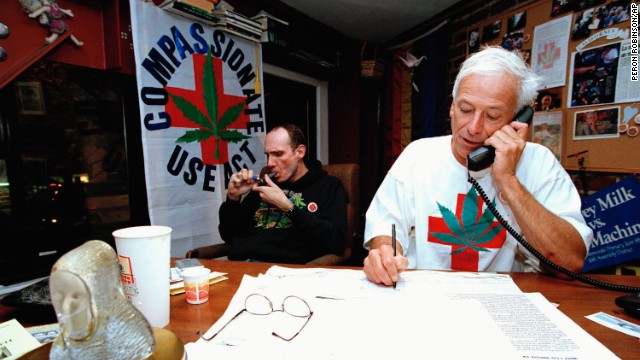 Dennis Peron takes notes during a phone interview while Gary Johnson lights up at the Proposition 215 headquarters in San Francisco on October 11, 1996. The ballot measure was approved when voters went to the polls in November, allowing medical marijuana in California.
Dennis Peron takes notes during a phone interview while Gary Johnson lights up at the Proposition 215 headquarters in San Francisco on October 11, 1996. The ballot measure was approved when voters went to the polls in November, allowing medical marijuana in California.
 A television ad aired in 1996 by Republican presidential candidate Bob Dole's campaign included footage from a 1992 MTV interview of a laughing President Clinton saying he would inhale marijuana if given the chance to relive his college days.
A television ad aired in 1996 by Republican presidential candidate Bob Dole's campaign included footage from a 1992 MTV interview of a laughing President Clinton saying he would inhale marijuana if given the chance to relive his college days.
 President George H. Bush holds up a copy of the National Drug Control Strategy during a meeting in the Oval Office on September 5, 1989. In a televised address to the nation, Bush asked Americans to join the war on drugs.
President George H. Bush holds up a copy of the National Drug Control Strategy during a meeting in the Oval Office on September 5, 1989. In a televised address to the nation, Bush asked Americans to join the war on drugs.
 Robert Randall smokes marijuana that was prescribed to treat his glaucoma in 1988. He became the first legal medical marijuana patient in modern America after winning a landmark case in 1976.
Robert Randall smokes marijuana that was prescribed to treat his glaucoma in 1988. He became the first legal medical marijuana patient in modern America after winning a landmark case in 1976.
 First lady Nancy Reagan participates in a drug education class at Island Park Elementary School on Mercer Island, Washington, on February 14, 1984. She later recalled, "A little girl raised her hand and said, 'Mrs. Reagan, what do you do if somebody offers you drugs?' And I said, 'Well, you just say no.' And there it was born." She became known for her involvement in the "Just Say No" campaign.
First lady Nancy Reagan participates in a drug education class at Island Park Elementary School on Mercer Island, Washington, on February 14, 1984. She later recalled, "A little girl raised her hand and said, 'Mrs. Reagan, what do you do if somebody offers you drugs?' And I said, 'Well, you just say no.' And there it was born." She became known for her involvement in the "Just Say No" campaign.
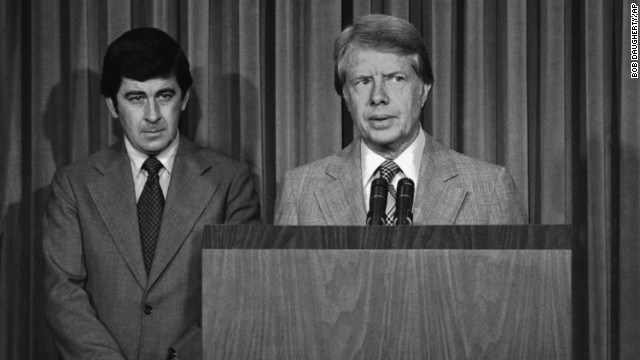 President Jimmy Carter, with his special assistant for health issues, Dr. Peter Bourne, beside him, talks to reporters at the White House about his drug abuse control message to Congress on August 2, 1977. Among other things, he called for the elimination of all federal criminal penalties for the possession of up to one ounce of marijuana.
President Jimmy Carter, with his special assistant for health issues, Dr. Peter Bourne, beside him, talks to reporters at the White House about his drug abuse control message to Congress on August 2, 1977. Among other things, he called for the elimination of all federal criminal penalties for the possession of up to one ounce of marijuana.
 Panel members of the National Commission on Marijuana and Drug Abuse attend a hearing In Denver on January 10, 1972. From left, Dr. J. Thomas Ungerleider, psychiatrist; Michael R. Sonnenreich, commission executive director; Raymond P. Shafer, commission chairman; Mitchell Ware, Chicago attorney; Charles O. Galvin, Dallas law school dean. The commission's findings favored ending marijuana prohibition and adopting other methods to discourage use, but the Nixon administration refused to implement its recommendations.
Panel members of the National Commission on Marijuana and Drug Abuse attend a hearing In Denver on January 10, 1972. From left, Dr. J. Thomas Ungerleider, psychiatrist; Michael R. Sonnenreich, commission executive director; Raymond P. Shafer, commission chairman; Mitchell Ware, Chicago attorney; Charles O. Galvin, Dallas law school dean. The commission's findings favored ending marijuana prohibition and adopting other methods to discourage use, but the Nixon administration refused to implement its recommendations.
 Protesters wade in the Reflecting Pool at the National Mall in Washington during the "Honor America Day Smoke-In" thrown by marijuana activists in response to the official "Honor America Day" rally organized by President Nixon supporters at the Lincoln Memorial on July 4, 1970.
Protesters wade in the Reflecting Pool at the National Mall in Washington during the "Honor America Day Smoke-In" thrown by marijuana activists in response to the official "Honor America Day" rally organized by President Nixon supporters at the Lincoln Memorial on July 4, 1970.
 Marijuana reform was the Life magazine cover story in October 1969. The banner read: "At least 12 million Americans have now tried it. Are penalties too severe? Should it be legalized?"
Marijuana reform was the Life magazine cover story in October 1969. The banner read: "At least 12 million Americans have now tried it. Are penalties too severe? Should it be legalized?"
 Police dogs trained to smell out hidden marijuana examine U.S. soldiers' luggage at the airport during the Vietnam War in 1969. Drug use was widespread during the war.
Police dogs trained to smell out hidden marijuana examine U.S. soldiers' luggage at the airport during the Vietnam War in 1969. Drug use was widespread during the war.
 People share a joint during a 1969 concert in Portland, Oregon. In 1973, Oregon became the first state to decriminalize cannabis.
People share a joint during a 1969 concert in Portland, Oregon. In 1973, Oregon became the first state to decriminalize cannabis.
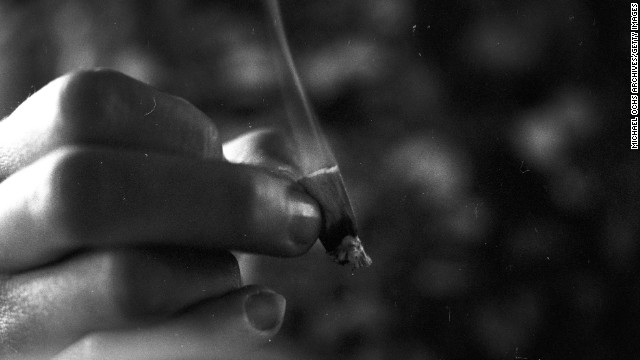 Marijuana use became more widespread in the 1960s, reflecting the rising counterculture movement.
Marijuana use became more widespread in the 1960s, reflecting the rising counterculture movement.
 Research scientist Dr. Reese T. Jones, right, adjusts the electrodes monitoring a volunteer's brain response to sound during an experiment in 1969 that used a controlled dosage of marijuana. The tests were conducted at the Langley Porter Institute at the University of California, San Francisco.
Research scientist Dr. Reese T. Jones, right, adjusts the electrodes monitoring a volunteer's brain response to sound during an experiment in 1969 that used a controlled dosage of marijuana. The tests were conducted at the Langley Porter Institute at the University of California, San Francisco.
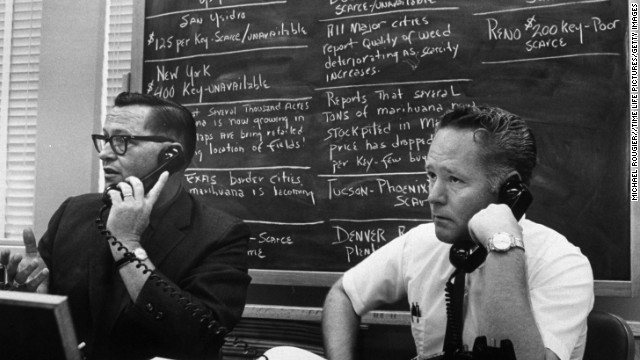 U.S. Customs agents track the nationwide marijuana market during Operation Intercept, an anti-drug measure announced by President Nixon in 1969. The initiative intended to keep Mexican marijuana from entering the United States.
U.S. Customs agents track the nationwide marijuana market during Operation Intercept, an anti-drug measure announced by President Nixon in 1969. The initiative intended to keep Mexican marijuana from entering the United States.
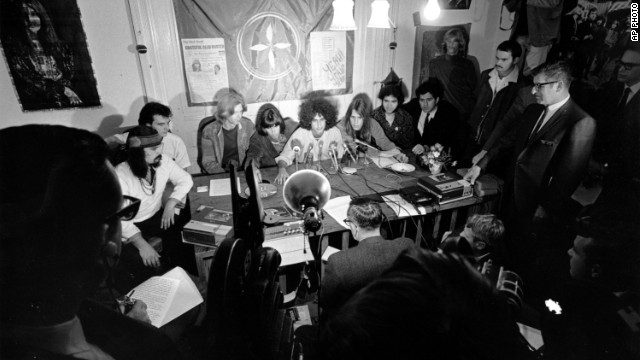 Members of the Grateful Dead talk with reporters from their home in San Francisco on October 5, 1967. The band was protesting being arrested for marijuana possession.
Members of the Grateful Dead talk with reporters from their home in San Francisco on October 5, 1967. The band was protesting being arrested for marijuana possession.
 A woman buys ready-rolled marijuana cigarettes from a dealer at her door circa 1955.
A woman buys ready-rolled marijuana cigarettes from a dealer at her door circa 1955.
 Even after Congress cracked down on marijuana in 1937, farmers were encouraged to grow the crop for rope, sails and parachutes during World War II. The "Hemp for Victory" film was released in 1942 by the U.S. Department of Agriculture.
Even after Congress cracked down on marijuana in 1937, farmers were encouraged to grow the crop for rope, sails and parachutes during World War II. The "Hemp for Victory" film was released in 1942 by the U.S. Department of Agriculture.
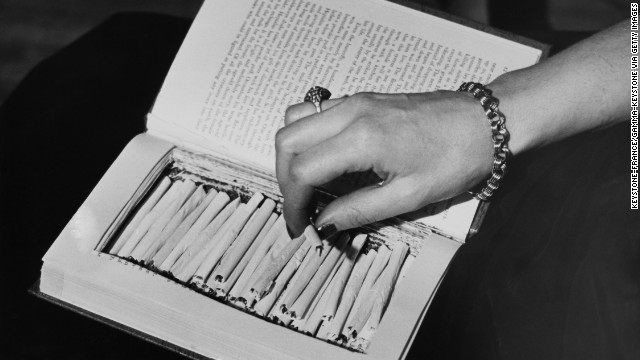 Marijuana cigarettes are hidden in a book circa 1940. Congress passed the Marijuana Tax Act in 1937, effectively criminalizing the drug.
Marijuana cigarettes are hidden in a book circa 1940. Congress passed the Marijuana Tax Act in 1937, effectively criminalizing the drug.
 A poster advertises the 1936 scare film "Reefer Madness," which described marijuana as a "violent narcotic" that first renders "sudden, violent, uncontrollable laughter" on its users before "dangerous hallucinations" and then "acts of shocking violence ... ending often in incurable insanity."
A poster advertises the 1936 scare film "Reefer Madness," which described marijuana as a "violent narcotic" that first renders "sudden, violent, uncontrollable laughter" on its users before "dangerous hallucinations" and then "acts of shocking violence ... ending often in incurable insanity."
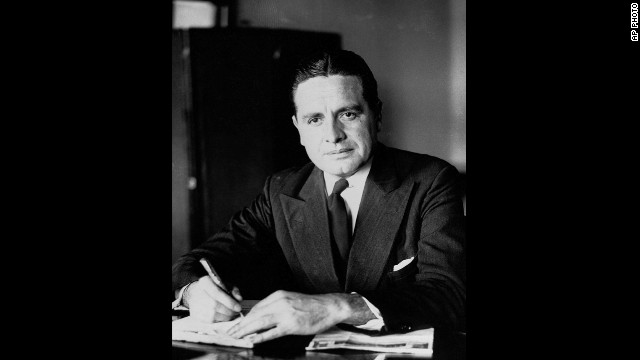 Harry Anslinger was named commissioner of the Federal Bureau of Narcotics when it was established in 1930. While arguing for marijuana prohibition, he played on Americans' fear of crime and foreigners. He spun tales of people driven to insanity or murder after ingesting the drug and spoke of the 2 to 3 tons of grass being produced in Mexico. "This, the Mexicans make into cigarettes, which they sell at two for 25 cents, mostly to white high school students," Anslinger told Congress.
Harry Anslinger was named commissioner of the Federal Bureau of Narcotics when it was established in 1930. While arguing for marijuana prohibition, he played on Americans' fear of crime and foreigners. He spun tales of people driven to insanity or murder after ingesting the drug and spoke of the 2 to 3 tons of grass being produced in Mexico. "This, the Mexicans make into cigarettes, which they sell at two for 25 cents, mostly to white high school students," Anslinger told Congress.

1

2

3

4

5

6

7

8

9

10

11

12

13

14

15

16

17

18

19

20

21

22

23

24

25

26

27

28

29

30

31

32

33
(CNN) -- Licenses were awarded to 20 medical marijuana dispensaries in Massachusetts, the first in the state after a voter-approved law went into effect in 2013, state officials announced Friday.
The Massachusetts Department of Health and Human Services said 100 finalists applied for licenses and were judged on how they served the public health, their security and strength of their business plans, as well as their focus on the ability to meet patients' needs.
"Health officials designed a rigorous process for vetting applicants," said the statement, citing a process that included a selection committee that determined the ability of each applicant to "meet overall health needs to registered patients while ensuring public safety."
The law went into effect January 1, 2013, and allows the department to register up to 35 nonprofit registered marijuana dispensaries.
In addition to the 20 approved, eight other applicants were qualified but the proposed locations were rejected, the statement said. Those applicants will be able to reapply in other counties that do not have a licensed dispensary, according to the department.
Patients who have a written certification from a physician for medical marijuana will be registered in an online system, according to the department.
Medical marijuana dispensaries serve clients who suffer ills ranging from cancer to AIDS to chronic pain.
Proponents say the drug's pain-relieving properties offer an alternative for cancer patients undergoing chemotherapy or radiation treatments.
<a href="http://ift.tt/1fj8Xub states have either decriminalized or allowed medical marijuana in some fashion. While the state laws have allowed dispensaries to open, they remain illegal under federal law. Fourteen states allow dispensaries, according to the National Conference of State Legislatures.

1
2
3
4
5
6
7
8
9
10
11
12
13
14
15
16
17
18
19
20
21
22
23
24
25
26
27
28
29
30
31
32
33
- Massachusetts grants licenses for 20 medical marijuana dispensaries
- Some 100 finalists applied for licenses
- A voter-approved law allows up to 35 non-profit registered marijuana dispensaries
(CNN) -- Licenses were awarded to 20 medical marijuana dispensaries in Massachusetts, the first in the state after a voter-approved law went into effect in 2013, state officials announced Friday.
The Massachusetts Department of Health and Human Services said 100 finalists applied for licenses and were judged on how they served the public health, their security and strength of their business plans, as well as their focus on the ability to meet patients' needs.
"Health officials designed a rigorous process for vetting applicants," said the statement, citing a process that included a selection committee that determined the ability of each applicant to "meet overall health needs to registered patients while ensuring public safety."
The law went into effect January 1, 2013, and allows the department to register up to 35 nonprofit registered marijuana dispensaries.
In addition to the 20 approved, eight other applicants were qualified but the proposed locations were rejected, the statement said. Those applicants will be able to reapply in other counties that do not have a licensed dispensary, according to the department.
Patients who have a written certification from a physician for medical marijuana will be registered in an online system, according to the department.
Medical marijuana dispensaries serve clients who suffer ills ranging from cancer to AIDS to chronic pain.
Proponents say the drug's pain-relieving properties offer an alternative for cancer patients undergoing chemotherapy or radiation treatments.
<a href="http://ift.tt/1fj8Xub states have either decriminalized or allowed medical marijuana in some fashion. While the state laws have allowed dispensaries to open, they remain illegal under federal law. Fourteen states allow dispensaries, according to the National Conference of State Legislatures.
via Smart Health Shop Forum http://ift.tt/1nyp6BK
No comments:
Post a Comment